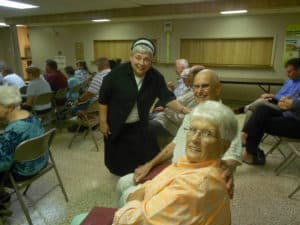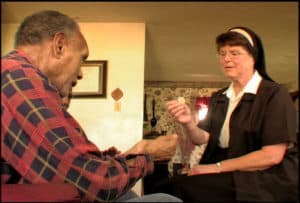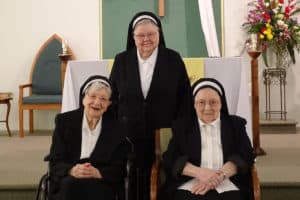During this Christmas Season Franciscan Sisters of Christian Charity Sister Kathleen Murphy spotlights Pope Francis’ December prayer intention for the elderly, as well as comments on Tom Kendzia’s song ‘Now is the Time’.
…Spirit of light, dance within our darkness. Make us your own, now is the time….” Again, Tom Kendzia’s song is a beautiful prayer for the beginning of our monthly reflection. During this Advent time we join with the Church and her liturgies to consider the coming of the Light of the World into our darkness whether personal, communal, political, ethical or universal. This Light that we await is a person. It is a Baby who brings the light of complete goodness to us. A baby is a bundle of possibilities, of hopes, of desires. Such a light can so easily be seen to dance in our darkness.
Pope Francis seems to reach out to the other end of the spectrum of life in his intention for this month. He asks us to pray, That the elderly, sustained by families and Christian communities, may apply their wisdom and experience to spreading the faith and forming the new generations.
With characteristic affirmation Pope Francis sees the elderly as gifts of wisdom and experience, as evangelizers and formators. Is this the way our society regards our senior members? This intention allows us to consider respect for the elderly which includes looking at the issue of euthanasia and assisted suicide.
We turn to the writings of Cardinal Gerhard Müller, Prefect of the Congregation for the Doctrine of the Faith. “Supporters of legal euthanasia argue that respect for self-determination entitles individuals to choose the time and manner of their death. They assert that this is a decision that only affects the patient and doesn’t cause harm or even involve anyone else. But human beings do not exist as atomized units whose actions are entirely limited to their own sphere of consequences. People exist in relationships to others. Euthanasia is not a self-contained act. If the key value involved in euthanasia is respect for self-determination, how would it be possible to set boundaries for who and for what reasons euthanasia would be acceptable. Would this argument not require all to be respected for their end-of-life decisions at any time and in any circumstance? 
Others advocating for euthanasia ground their claims in compassion for the suffering and dependent. Statistics prove that in areas where euthanasia has been legalized, there soon follows a decrease in effective pain management of all patients. Once euthanasia is an option, it quickly becomes the easiest path for decision-makers. We also see grave issues developing around the whole question of quality of life. When others are readily called upon to judge the quality of life of someone else we can begin to see both nonvoluntary and involuntary euthanasia. The goodness of a society can be measured by how well it treats and protects its weakest and most vulnerable members. Nations that legalize euthanasia fail to care rightly for the least of our brothers and sisters.”
We have only to look to some of our Advent Biblical characters to see the immeasurable treasure found in our elders. We look to Zechariah and Elizabeth, Anne and Joachim, to the Prophetess Anna and to Simeon. We look back to the Old Testament giants like Noah, Abraham, Sarah, Isaac, and Jacob who served mightily in their old age.
In terms of our own daily living, we are not often faced with the tragedy of euthanasia, but we can examine how we regard the elderly children of God we meet each day. Our Core Values state: We work at building community by being grateful for each other. Do we treasure those who struggle to walk, to see or to hear? Do we bring gentleness to our interactions with those who can’t always remember or find the words they need to express themselves? Do we value their wisdom and giftedness? We are blessed by their presence, for now is the time!


